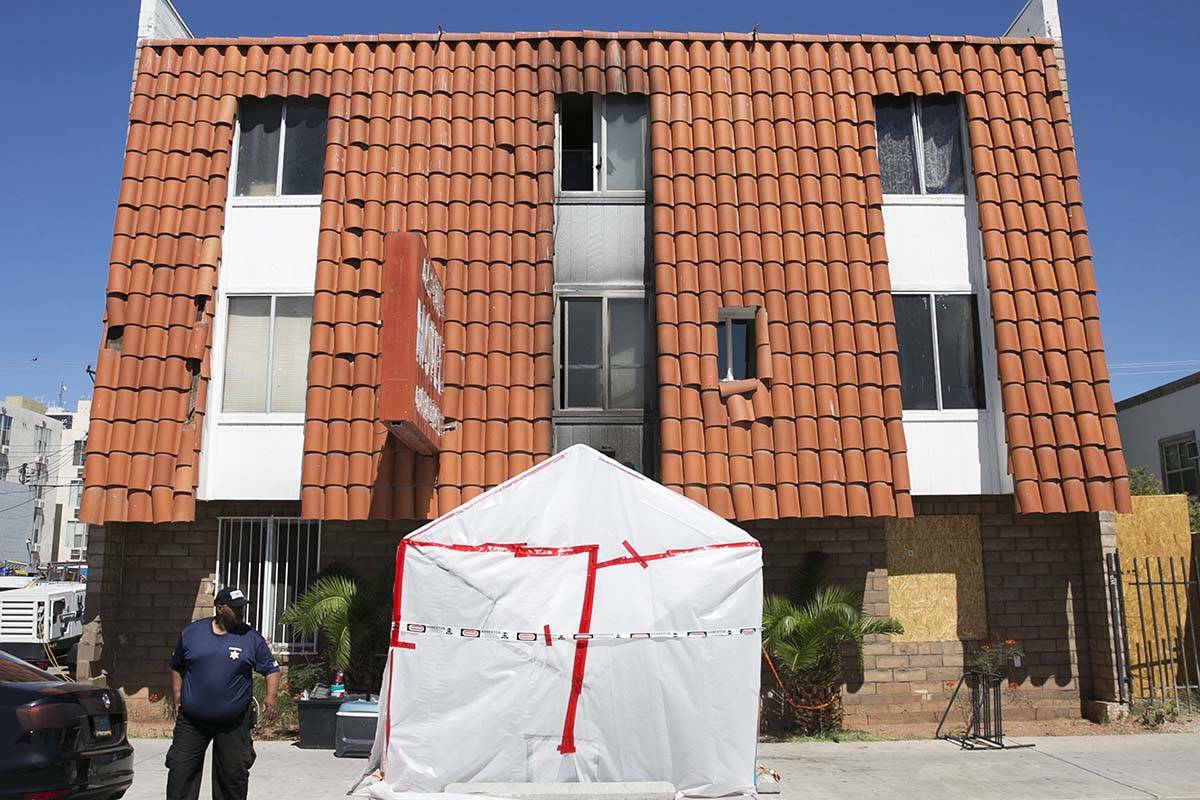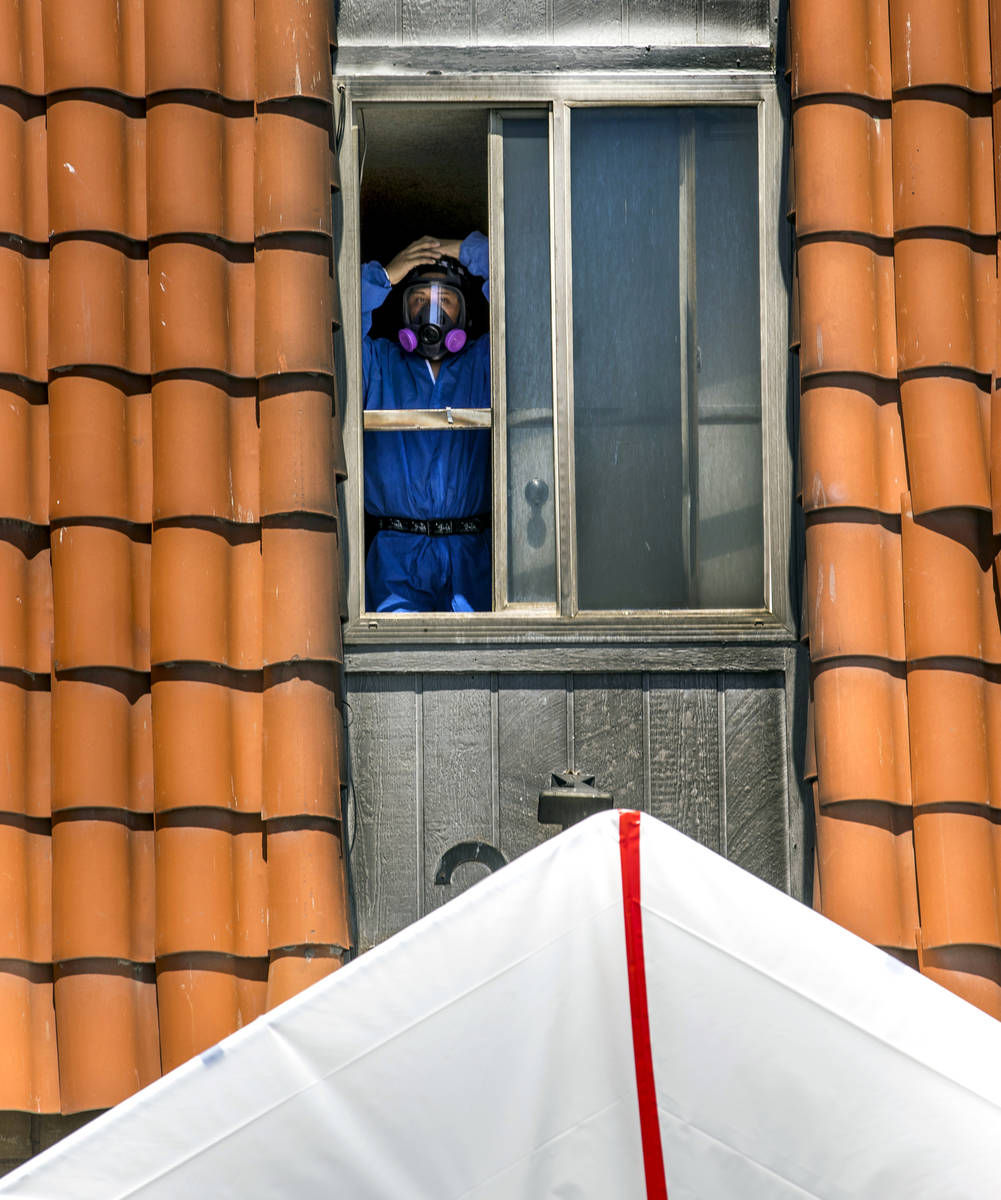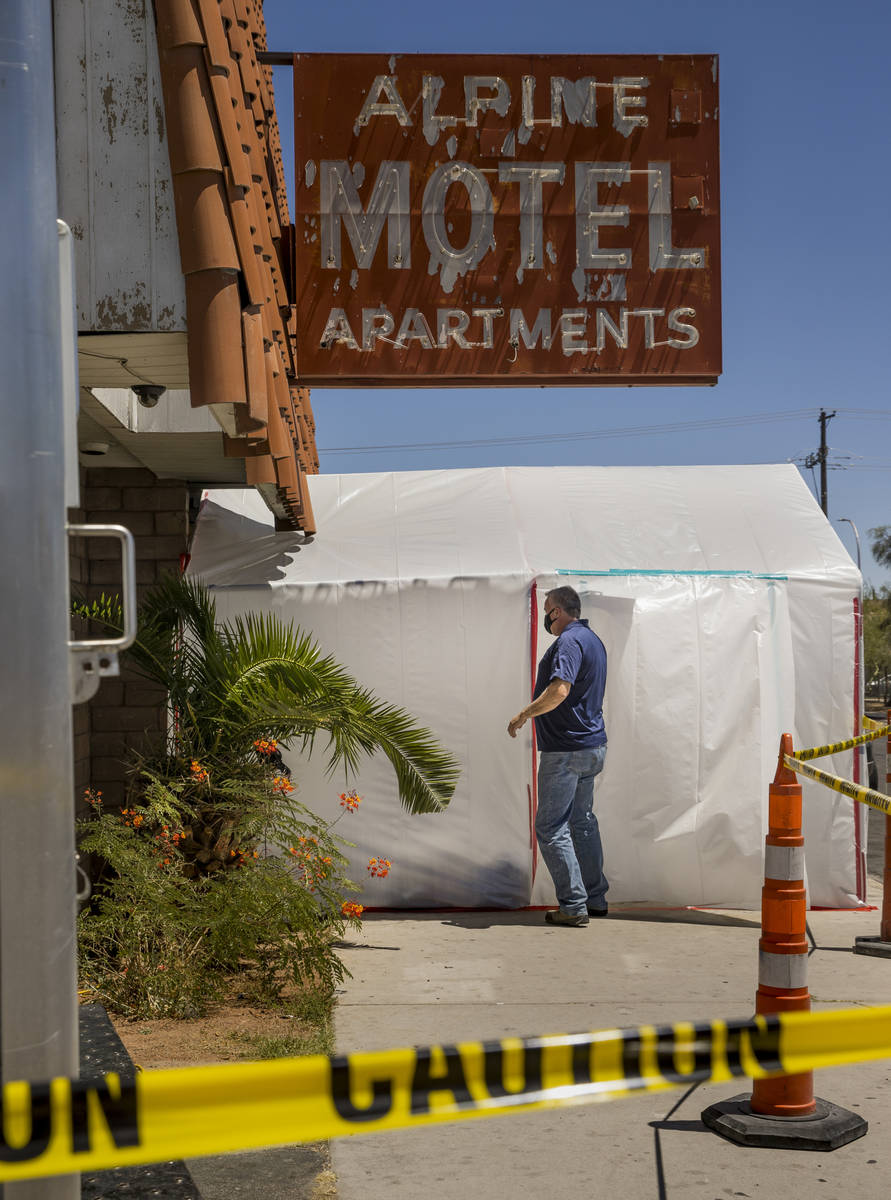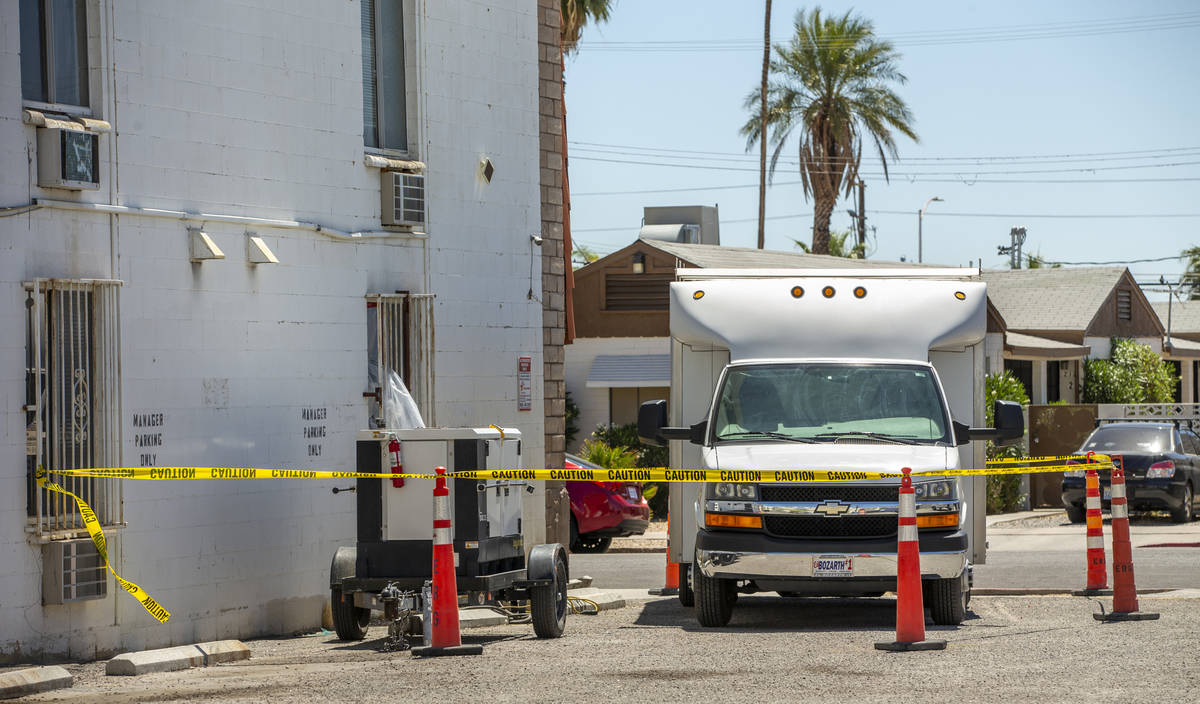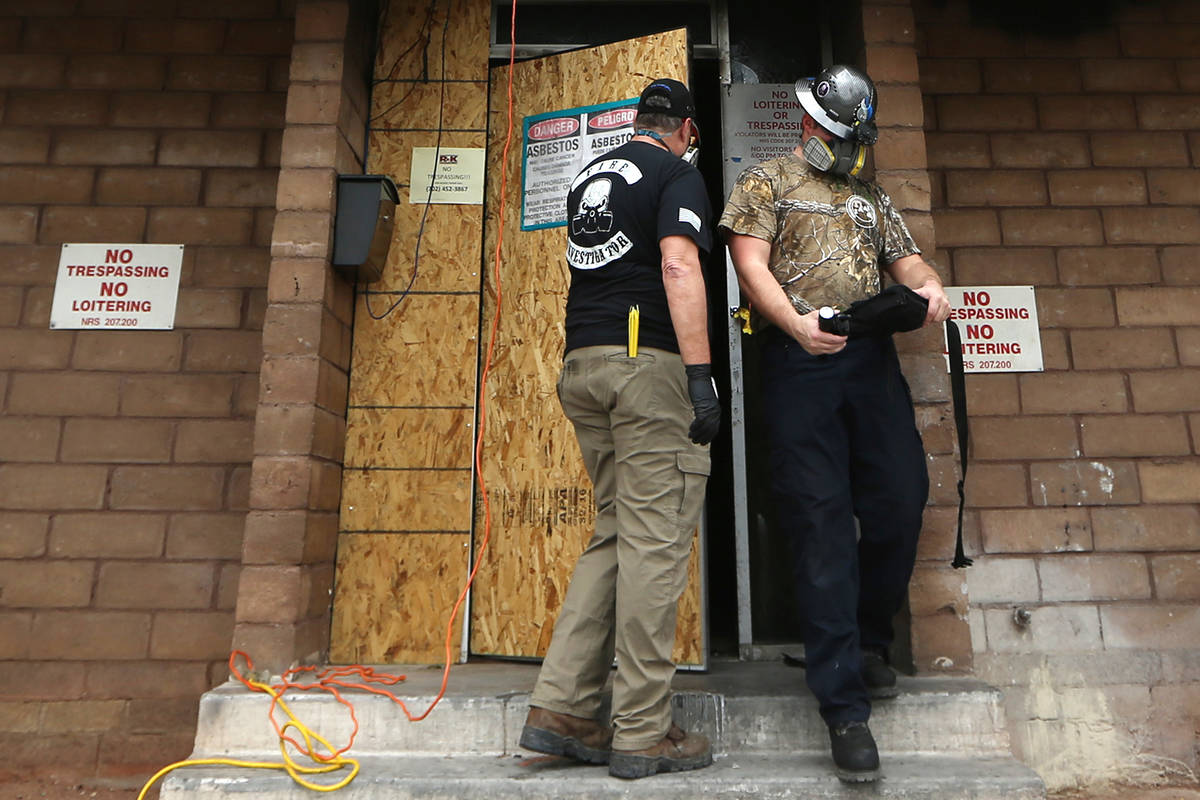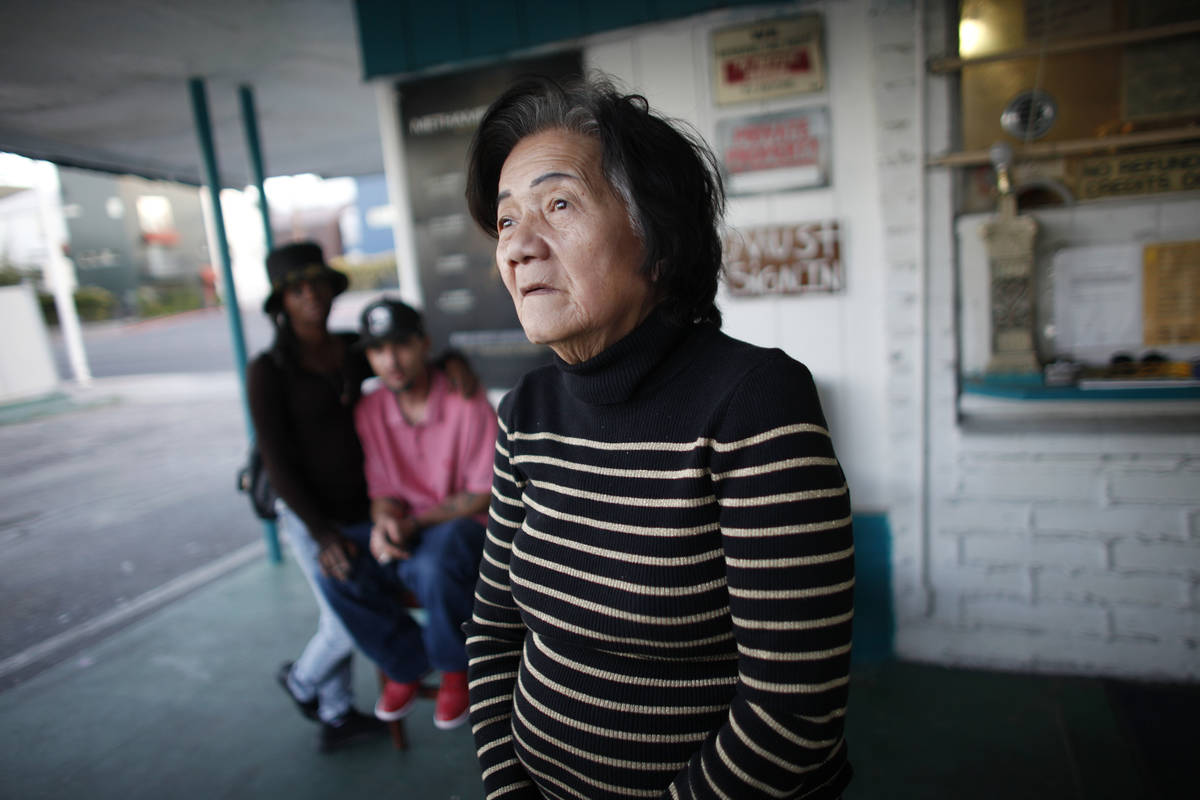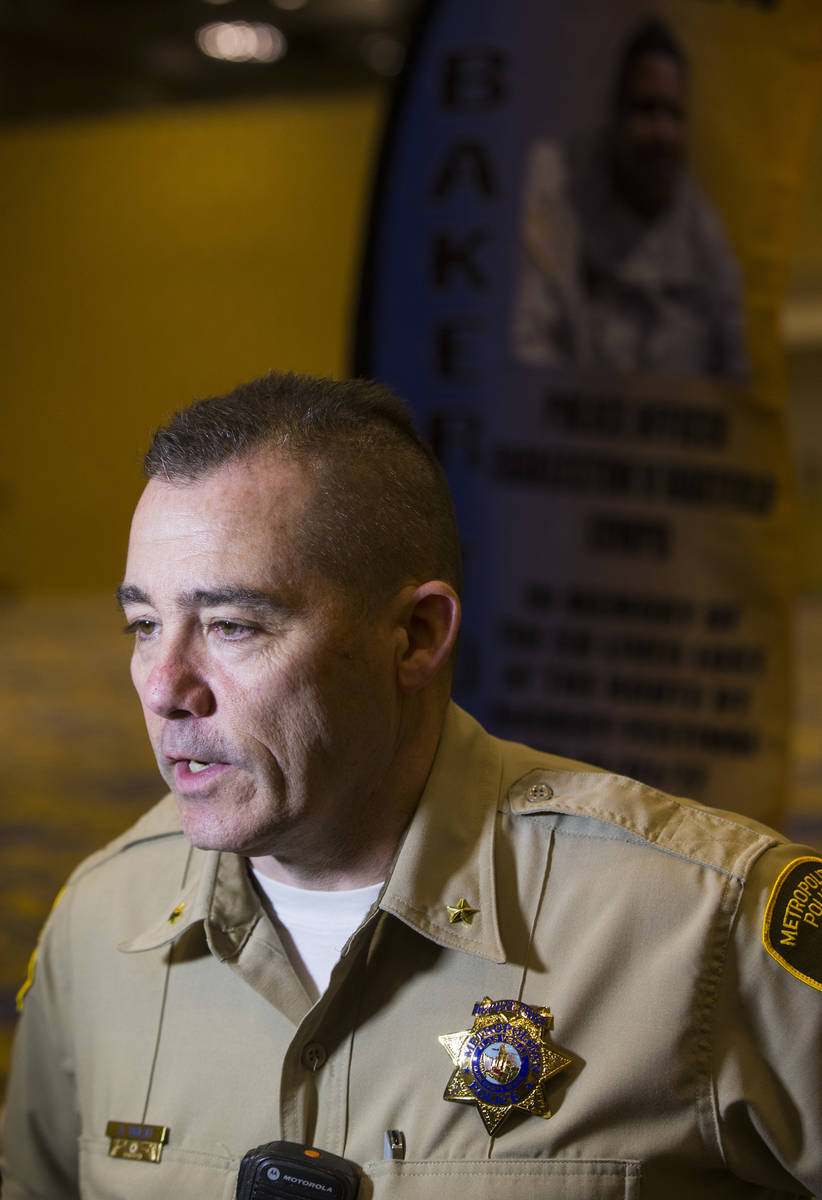Police called Alpine ‘the worst of the worst’ and tried to close it. Las Vegas officials said no.
Three years before a fire killed six people at the Alpine Motel, Las Vegas police Capt. Andrew Walsh and his officers were working hard to get the downtown property shut down as a chronic nuisance, city records show.
But city officials opposed the nuisance action, writing they didn’t believe the property, which garnered more than 150 police calls for service in three years, was worthy of one of the most severe actions the city can take against a property and its owners.
A previous Review-Journal investigation showed the property was the subject of repeated code enforcement inspections and failed fire inspections between 2013 and 2017, and had not been inspected by fire officials in the 32 months leading up to the December 2019 fire.
The city of Las Vegas’ nuisance ordinance gives authorities a powerful tool to fight problem property owners.
But since 2017 — which is as long as the city says it keeps records — only one property was deemed dangerous enough to close under the law, records obtained by the Review-Journal show. That property, the Safari Motel, had a fatal shooting and was the focus of repeated police drug raids.
Walsh, who was promoted to deputy chief at the end of 2017, said he had to defer to city officials about whether to designate the Alpine a chronic nuisance.
“I tried to close the Alpine,” he said. “When this was happening, we were shocked at the conditions at the Alpine.”
But Donald Walford, a downtown businessman who is part of a group dubbed the “God Squad” that is trying to clean up the area, said the city dropped the ball by blocking Metropolitan Police Department officers from bringing the nuisance action that might have prevented the loss of life in December’s fire.
“They didn’t have the stomach to do this,” Walford said.
Under the ordinance, the city can ask a judge to order boarding up the building for up to a year and could charge the owner with a misdemeanor if there are repeated crimes on the property, or the property was used for drug production or sales.
The city refused to go forward before the December fire, but city staff started looking into the chronic nuisance ordinance related to the Alpine after the fatal blaze, records show.
The tragedy left six dead, and inspectors in its aftermath noted more than 40 fire code violations, including an exit door bolted shut from the outside. The boarded-up property, built in 1972, has been the focus of a criminal investigation since December and remains vacant. Residents were finally allowed to start collecting belongings the week of June 8 after removal of dangerous asbestos.
Police action
Downtown activists and residents had been complaining about the Alpine and other area properties for years, saying they attracted drug and gang activity, according to police emails and interviews with several residents. The emails, obtained under the state’s public records law, show that Walsh and his officers apparently took those concerns seriously.
“(C)an you have Fire Inspectors check the Alpine Motel for me … 213 N. 9th street,” Walsh wrote deputy city attorney David Bailey on March 10, 2016. “I’m getting a ton of complaints about the conditions there.”
That same month, police contacted Alpine workers about junk cars on the property and met with the manager about trash on the property, police logs show. Police received 10 calls of disturbances and assaults on the property, including a shooting in the hallways during that month, Metro service call logs show.
“We had a shooting at the Alpine over the weekend,” Walsh wrote Bailey on March 28, 2016. “This place needs to go.”
Bailey emailed Walsh several times that March updating him on the code and fire violations and saying the owner was making the fixes. Bailey did not respond to requests for comment.
On March 31, 2016, Metro officer Steven Rollo wrote he was working on a chronic nuisance action against the Alpine and wanted city staff’s help in identifying all of Alpine owner Adolfo Orozco’s Las Vegas properties.
“I spoke with your coworkers after (a)… meeting yesterday and asked them about a property owner named Adolfo Orozco,” Rollo wrote a senior licensing officer. “She knew who he was and didn’t (have) anything good to say about him.”
[ Alpine Motel Apartments fire brought scrutiny to secretive former schoolteacher Adolfo Orozco ]
[ Alpine owner was part of a federal drugs, cartel investigation ]
In an email on Nov. 3, 2016, Walsh called out city inspectors for finding dozens of problems but failing to close the Alpine, saying he can’t solve the problem with arrests.
If “we simply go out with all of the resources, find violations on these properties and do not close the property down, then the problems will persist,” he wrote. “A perfect example is the Alpine Motel. Everyone did a great job in going out and finding the violations which I believe were upwards of 70 different violations … from building codes to fire violations … and the property remained open and is still the number one property with regard to the complaints I receive.”
Walsh, in an interview with the Review-Journal, declined to criticize city officials but said that police were intent on cleaning up the Alpine.
“As captain, I wanted a safe place for people to live, a safe place for people to work and a safe place for people to visit,” he said.
City did not act
The police continued to receive regular calls about thefts, assaults, a domestic violence incident with a knife and other disturbances at the Alpine, but city officials did not act on Metro’s push for a chronic nuisance designation.
On Jan. 11, 2017, Anthony Krieg, a code enforcement officer, wrote his supervisor that he and Rollo told Orozco that he had to vet his tenants. “The fact that he rents to anyone and does no background checks just contributes to the criminal activity,” Krieg wrote code enforcement supervisor Vicki Ozuna.
But Krieg wrote that Orozco always addresses the concerns from the city and makes fixes, adding: “These neighbors/owners have the Captain’s ear at these monthly “God Squad” meetings.”
Ozuna wrote back that she told Metro that the Alpine didn’t qualify for the chronic nuisance. “I explained to the officer that this property is not in bad enough shape for us to support that unless they can get their calls for service to support their claim,” she wrote Jan. 10, 2017.
Krieg referred Review-Journal questions to city public relations staff, and Ozuna did not respond to repeated calls and email seeking comment.
On the same date as the email, the Southern Nevada Health District conducted an inspection sparked by a Metro officer’s complaint, finding trash, used needles, feces and other debris on the property. SNHD inspectors closed the case three months later after a reinspection showed Alpine workers had cleaned it up, records show.
The last time fire inspectors had visited the property was in April 2017. After the fire last year, fire marshal Robert Nolan acknowledged that the department should have inspected it before the deadly blaze.
City spokesman Jace Radke declined to set up an interview with city inspectors but issued a statement about why the city didn’t support a chronic nuisance against the Alpine.
“In this case, and at that time, the issues that Metro was concerned about related to the property were criminal in nature, not issues related to property maintenance or building or zoning code violations,” the statement said. “While our chronic nuisance ordinance allows action for repeated criminal activity, evidence must be presented and the property owner must have an opportunity to remedy the situation.”
Las Vegas Councilman Cedric Crear, whose ward includes the Alpine, said after the fire that the city “would have a full and thorough investigation” and that there “seemed to be a lot of discrepancies going on at that facility.” He did not respond to repeated requests for comment about the city’s use of the chronic nuisance ordinance.
Broad ordinance
While city officials didn’t feel the Alpine deserved the chronic nuisance designation, the ordinance is written so broadly that the city probably could have acted if officials wanted to go forward. The ordinance requires three or more nuisance violations to happen in any 30-day period, but those could be anything from weeds and graffiti on the property to violence and drugs.
Police records show that calls for service of that nature happened regularly at the Alpine and often within 30 days of each other.
Dominic Gentile, one of Orozco’s attorneys, agreed that chronic nuisance is a “very broad statute” but said the fact the city didn’t use it against the Alpine is proof the property was appropriately managed and maintained.
“They probably didn’t issue one because there were many places that were much worse,” he said. “How am I going to comment about something that didn’t happen?”
Walsh said his officers were not able to satisfy the city that the property had to be closed down, adding that closing it would come with its own set of problems, such as finding different places for impoverished residents to live.
“It’s a powerful tool and it’s an effective tool, but the city has to amass the criteria to make a case for a chronic nuisance,” he said. “With the type of violations they had, we never got there.”
But Father Courtney Edward Krier, who is pastor of St. Joseph’s Catholic Church, which is less than a block away from the Alpine, said there were plenty of problems that should have prompted Las Vegas officials to close the motel.
“It’s really, really difficult for me to understand why the city doesn’t deal with these properties or doesn’t want to have the bother and worry,” he said. “Like ostriches, they put their heads in the sand and hope it will go away, but this one won’t go away — it will be there forever because lives were lost.”
Despite the city rejecting the nuisance action in January 2017, police weren’t done.
Metro assistant general counsel Matthew Christian emailed Bailey on Sept. 12 saying the department is interested in a chronic nuisance action against the Alpine and asking for his thoughts. “Ofr Rollo has identified Alpine as the worst of the worst,” he wrote. Christian declined comment.
On June 26, 2018, Metro officer Cody Vigil wrote SNHD that police were still investigating the Alpine. “We have had multiple issues there and are looking into opening a chronic nuisance case on the property,” he wrote.
SNHD found nothing outside the facility and noted anything inside the motel was outside their scope.
After last year’s fire, city officials started researching the chronic nuisance law in relation to the Alpine, emails show. A business license manager sent a list of city interactions with the Alpine to planning director Robert Summerfield on Dec. 24 and three days later provided him with Las Vegas Municipal Code that allows officials to discipline a licensed property for chronic nuisances.
Summerfield, in an email exchange with the Review-Journal, said he was gathering information to help the city investigate the fatal blaze. The “code language was provided to me as I had asked the question about what provisions the Licensing Code (LVMC Title 6) provides regarding our ability to take action on a license,” he wrote. “This was information gathering not specific to taking any action at that time.”
Safari Motel was closed
While the Alpine escaped closure as a chronic nuisance, around the same time and a mile away city officials were cracking down on the Safari Motel. A maintenance man was fatally shot there in April 2016, and Metro officers served drug search warrants on four different rooms in early 2017.
Safari owner Wendy Yeh, in documents fighting the action, claimed officials were pressuring her to sell the Safari for a reduced price.
“The LVMPD have targeted Safari to report an increase in criminal activity when it is a known fact that these alleged activities take place at nearby businesses as well,” she wrote Mayor Carolyn Goodman on April 3, 2017.
Yeh also complained that the city had not provided her any redevelopment assistance that neighboring properties received.
Walsh said the Safari was much worse than the Alpine. “The squalor and documented violent crime at the Safari — we simply did not have that at the Alpine,” he said.
A judge allowed the city to close the Safari in the fall of 2017. In May 2019, Yeh sold the property to an LLC based in Beverly Hills, California, for $950,000, records show.
The city then gave the new developer $95,000 to help with a $440,000 renovation of the motel at 2001 Fremont St.
Reached in California where she retired, Yeh declined comment, saying she was ill with high blood pressure, suffering from a brain tumor and didn’t want to relive the situation.
“I don’t want to go back,” she said in a brief phone interview. “Please leave me alone.”
Contact Arthur Kane at akane@reviewjournal.com. Follow @ArthurMKane on Twitter. Kane is a member of the Review-Journal’s investigative team, focusing on reporting that holds leaders and agencies accountable and exposes wrongdoing.



